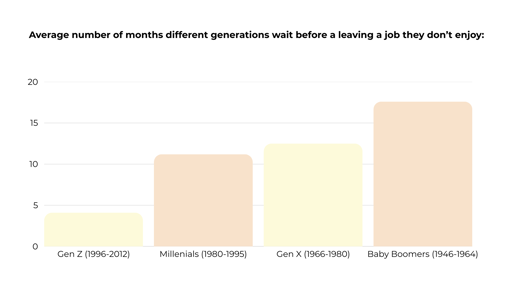What's on this page?
Jump to:
- Reasons You Might Consider a Career Change at 30
- Five Common Reasons for Changing Career at 30
- Five Advantages of a Career Change at 30
- Challenges of a Career Change at 30 (and How to Overcome Them)
- Five Steps to Retraining and Changing Careers at 30
- What NOT to Do When Changing Careers at 30
- A Career Advisor’s Advice: 5 Quick-Fire Top Tips for Changing Careers at 30
- The Five Best-Paid Careers and Roles for Career Changers Aged 30
- Student Success Story: Changing Careers at 30
- Final Thoughts: How to Change Careers at 30 and How Learning People Can Help You
- FAQS on Changing Careers at 30
Reasons You Might Consider a Career Change at 30
By the time you hit 30, you’ve likely had around a decade to test out the working world. Maybe you’ve stayed on one career track and realised it isn’t what you expected. Or perhaps you’ve tried a few different roles and still haven’t found the one that truly fits. Either way, it’s common to pause at this stage and wonder if there’s something better out there.
This is also a natural point in life to reassess your priorities. Many people today are waiting longer to buy a home or start a family, if at all, meaning for many, the pressure is off to get to the highest-paying, most senior roles in your 30s -- you have time to explore other job fields.
And don't forget: with the ten odd years of skills and experience under your belt, you’re in a far stronger position to pivot than you were in your early 20s.
30 isn’t a deadline to have your entire life figured out for good. It’s often the perfect springboard for a smarter, more deliberate planning of your future, including your career.
Use our free career-match quiz to discover your next role
The MyCareerMatch Career Profile quiz is a scientific, government backed, powerful assessment that matches your personality style to a career you would love.
It takes just a few minutes to complete, and the report will be completely personalised to you.
We've seen hundreds of people start their new career journey by using the MyCareerMatch quiz.

Five Common Reasons for Changing Career at 30
By 30, many people find themselves reflecting on where they are and where they’d like to be. Here are some of the most common reasons I hear from career changers who want to take the leap at this stage:
- Seeing the window of opportunity: You’re old enough to bring valuable skills, but young enough to reskill quickly and still enjoy decades of growth in a new field.
- Feeling stuck on the wrong path: After a decade in the workforce, it’s natural to question whether your current career is the right fit. Thirty is often when that sense of “this isn’t for me” becomes too strong to ignore.
- A desire for more meaningful work: Your 20s may have been about building a CV or paying the bills. By 30, priorities often shift towards finding work that feels more fulfilling and aligned with your values.
- Better financial stability: Many feel that having their finances in order increases in importance once they leave their 20s. They think more about building a financially secure future, and part of that will be finding a career that offers decent wages, pay progression, and security.
- Life reassessment moments: Milestones like moving cities, ending a relationship, or simply hitting a birthday with a zero can spark the motivation to make a bold change.
Five Advantages of a Career Change at 30
Changing career at 30 isn’t a setback; it’s often the perfect timing. You have the energy and adaptability of someone still early in their working life, combined with the experience and perspective to make smarter choices.
- You still have decades of career ahead: At 30, you’re far from “too late.” Most people will work for around 40 more years, giving you time to experiment and even pivot again if needed.
- You bring a decade of experience with you: Even if you switch industries, the skills you’ve developed (communication, problem-solving, teamwork) are exactly what employers value.
- You make more informed decisions: Unlike at 20, you now likely have the clarity of knowing what you don’t want. That focus helps you choose a path that’s a better fit.
- You’re better positioned financially: With 10 years of earning under your belt, you may have savings or stability that make retraining more realistic (although don't forget, with flexible online learning, you can learn and earn).
- You’re still adaptable: Employers know 30-somethings can quickly learn new tools and technologies while bringing maturity and reliability to their roles.
Challenges of a Career Change at 30 (and How to Overcome Them)
While 30 is a great time to switch careers, it’s natural to feel cautious. Most 30-something year old career-changers I speak to have similar concerns about whether it's the right time to make a pivot, and all these worries are valid. However, they can be overcome with the right strategy.
-
Financial uncertainty: You might worry about losing income or starting at a lower salary. Planning ahead with savings, side training, or part-time learning that lets you earn while you learn can ease the transition.
-
Fear of “starting over”: After a decade of experience, it’s daunting to imagine being a "beginner" or the “new person” again. Remember: you’re not starting from zero – your transferable skills have real value. Plus, people change or start careers much, much later than 30 -- at 40, 50, or even later these days.
-
Competitive job market: Employers often look for industry-specific experience. The solution? Certifications, career-focused training, and networking to close that gap fast. Many jobs in tech will take you on at entry level with courses that can be completed in as little as three months.
-
Balancing personal commitments: Whether it’s a mortgage, family plans, or other responsibilities, time can feel limited. Structured learning paths and flexible training options help make it manageable. You can learn online, in your own time, at your own pace.
-
Self-doubt: It’s easy to think “I’ve left it too late.” The truth? Most successful career changers we work with are in their 30s or 40s.
With the right approach, these hurdles become stepping stones rather than roadblocks.
Did You Know? A Third of UK Workers Plan to Change Jobs in 2025
Earlier this year, Recruitment South East reported on a survey from Indeed Flex revealing that 1/3 of the UK's workforce was looking to transform their career or change jobs in 2025. While the respondents to the survey were made up of several different demographics, it seemed that younger people are more likely to be looking to pivot than older generations (and yes, 30 is still considered young).
While, sadly, 40% of these people are looking to switch so they can earn a higher salary and better keep up with growing living costs, 12% are doing this in order to find work offering more meaning and fulfilment.
A useful takeaway? If you're looking to change jobs at 30, you are not alone by any means! Many in the UK are opting for non-linear career paths to build themselves a more fulfilling, financially secure future.

Five Steps to Retraining and Changing Careers at 30
At 30, you’re old enough to know what isn’t working for you, but still young enough to make a bold career move. Here’s how to approach it in a practical way:
-
Clarify what you really want: Take stock of your priorities now. Is it financial growth, flexibility, or doing something more meaningful? This helps you filter out the wrong paths before you waste time or money.
-
Focus on realistic, high-growth industries: Tech, cybersecurity, project management, and data roles are particularly suited to career changers because they value transferable skills as much as formal experience.
-
Invest in targeted training: At this stage, you don’t need another degree. Short, industry-recognised certifications are the fastest way to bridge gaps and build credibility.
-
Reframe your experience: Create a CV and LinkedIn profile that translate your last decade of skills into language that resonates with employers in your chosen field.
-
Leverage your network: Reach out to people who’ve made similar transitions. Their insight, and introductions, can save you months of trial and error.
What NOT to Do When Changing Careers at 30
Changing careers at 30 is exciting, but there are a few common mistakes that can stall your progress. Avoid these pitfalls to keep your move on track:
First, don’t make an impulsive leap. Quitting without a clear plan can create unnecessary financial stress. Take the time to research, retrain, and line up realistic options before handing in your notice.
Next, don’t ignore your transferable skills. Many career changers underestimate the value of what they already know. Your past experience, whether in problem-solving, teamwork, or leadership, is an asset. Don’t start from scratch when you don’t have to.
Finally, don’t go it alone. Trying to figure everything out by yourself can be overwhelming. Leverage career support services, mentors, and training providers who specialise in helping career changers at your stage.
A Career Advisor’s Advice: 5 Quick-Fire Top Tips for Changing Careers at 30
Changing careers at 30 doesn’t have to be overwhelming. However, it does require focus. Here are my top tips, drawn from years of advising career changers just like you:
-
Treat your 20s as research, not wasted time: The jobs you’ve tried so far have given you clarity about what you do and don’t want. Use that knowledge to make a smarter, more targeted move now.
-
Plan for a “transition” stage, not an overnight switch: Many successful career changers take a phased approach: part-time study, side projects, or freelance work before fully stepping into a new role.
-
Get comfortable selling your story: At 30, your experience is an asset. But only if you can connect the dots for employers. Practise explaining why you’re switching and how your skills transfer.
-
Invest in the right skills early: Focus on training that’s directly aligned with in-demand roles. Certifications in areas like IT, project management, or cybersecurity can fast-track your move.
-
Don’t underestimate networking: Industry events, LinkedIn groups, and even informal coffee chats can unlock opportunities you won’t find on job boards.

The Five Best-Paid Careers and Roles for Career Changers Aged 30
At 30, you’ve got time on your side. You’re young enough to retrain quickly, but experienced enough to bring valuable transferable skills. Here are five career paths that are realistic to enter at this stage – and offer strong salaries and future-proof growth.
-
Cybersecurity Analyst: Businesses are struggling to hire security talent fast enough. With training courses like Certified Information Systems Security Professional (CISSP) that can be completed in under a year, you can step into entry-level roles with clear pay progression.
-
Data Analyst: If you’re detail-driven, this is an accessible tech pathway. Many employers value analytical thinking over formal experience, and training courses like Microsoft Certified: Azure Fundamentals AZ-900 can get you job-ready within months.
-
Business Analyst: A great option for career changers who enjoy problem-solving. Your previous industry experience can help you bridge the gap between technical teams and stakeholders while earning a competitive salary.
-
Cloud Support Engineer: Cloud skills are in demand across industries. You don’t need to be an IT veteran. Short, targeted certifications like AWS Certified DevOps Engineer - Professional can unlock high-paying roles and fast progression.
-
Project Manager: Your 20s often teach you how to organise, communicate, and manage deadlines – exactly what project management demands. With certifications like AgilePM®, you can turn those skills into a lucrative career.
Student Success Story: Changing Careers at 30
In the 15 years that Learning People has been operating, we've helped just shy of 50,000 students gain new certifications, and thousands of these have landed new roles. This includes many who are in their 30s.
Riekert, for example, made the switch into a fulfilling career in cyber security in his 30s. You can hear more about his journey and successful career change in his video below, or have a look at more of our student success stories:
Riekert Jansen Van Rensburg
Riekert had been working in different sales positions throughout his 20s but was desperately unhappy. Riekert reached out to us and after a detailed consultation with one of our Senior Career Consultants, enrolled onto our Cyber Security Analyst collection.
Final Thoughts: How to Change Careers at 30 and How Learning People Can Help You
Changing careers at 30 isn’t a setback; it’s a strategic move. You’ve got enough experience to know what you want, and plenty of time to build a new, future-proof career.
By understanding your motivations, tackling challenges head-on, and taking practical steps like upskilling and networking, you can turn this decision into the best career choice you’ve ever made.
At Learning People, we specialise in helping career changers like you. From expert-led training to personalised career support, we can guide you every step of the way.
It's free to speak to one of our career consultants. Hit the button below to leave your details; it take about one minute, and one of our Consultants will be in touch usually within one working day.
FAQS on Changing Careers at 30
Related Articles
 Career Advice
Career AdviceThe Uses and Impact of AI in Cyber Security
Discover how artificial intelligence is transforming cyber security, from detecting and responding to threats faster, to strengthening defence strategies across networks and systems. By understanding how AI is applied in this fast-evolving field, you’ll gain the knowledge and skills to launch or advance your career in cyber security.
Read More Career Advice
Career AdviceThe Uses and Impact of AI in Data Analytics
Discover how artificial intelligence is driving and transforming data analytics, from uncovering deeper insights to driving smarter business decisions. Learn about the key uses, benefits, and real-world impact of AI in analytics, and explore how these innovations are shaping the future of data-driven industries.
Read More Changing Career
Changing CareerHow to Write a Career Change Cover Letter, with Examples
When changing careers, the way you apply for jobs will be different from usual, and this includes how you write your cover letter. As a career advisor, I share some of the advice, tips, and tricks for writing a career change cover letter, as well as an adaptable cover letter template and examples.
Read More Career Advice
Career AdviceLeadership Soft Skills for the Tech Sector
Discover the leadership soft skills that elevate you from officer, to manager, to senior leader. Learn which to prioritise and how to develop communication, empathy, resilience and more for a successful career in IT, Project Management and beyond.
Read More

